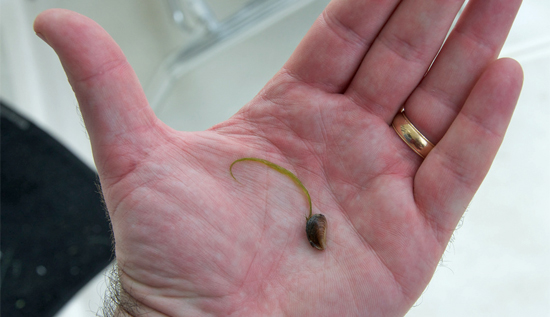Invasive zebra mussel found for first time in Maryland’s Sassafras River
The invasive zebra mussel found for the first time in the Sassafras River, a tributary of the upper Bay on Maryland’s Eastern Shore.
The invasive zebra mussel has been found for the first time in the Sassafras River, a tributary of the upper Chesapeake Bay on Maryland’s Eastern Shore.

A citizen found a single adult zebra mussel attached to a dock and reported it to the Maryland Department of Natural Resources (DNR). The mussel was discovered in the lower Sassafras River near Turner Creek.
Although the discovery does not necessarily mean that zebra mussels have established themselves in the Sassafras River, it is very unlikely that this single mussel is the only one in the river, according to DNR biologist Ron Klauda.
Biologists believe that unusually low salinity levels in the upper Bay this summer may have allowed zebra mussels to expand beyond the Susquehanna River, which is the only other river in Maryland where the species has been discovered. This means that zebra mussels could have spread to other rivers in the region, such as the Bohemia, Elk or Northeast rivers.
Tiny zebra mussels have caused significant ecological and economic damage in North America. They are extremely efficient filter feeders that significantly reduce the amount of plankton available to native aquatic life. Massive clumps of zebra mussels can also encrust boat hulls, damage power plant intakes and disrupt municipal water systems. Since they were introduced in the Great Lakes in the 1980s, zebra mussels have caused more than $5 billion in damages and losses in North America.
Zebra mussels spread mainly by attaching themselves to boats, boat trailers and other watercraft. Recreational boaters can unknowingly carry zebra mussels and larvae in bilges, bait buckets, coolers or on aquatic vegetation clinging to boat props and trailers.
If you think you’ve found a zebra mussel in a Maryland waterway, you should report the discovery to DNR by calling (410) 260-8615. For more information about the discovery, visit DNR’s website.
Image courtesy John Tolva/Flickr

Comments
Zebra mussels are an invasive species that can each filter up to a gallon of water a day. They have a much higher reproductive rate than native species of mussels. Zebra mussels have reduced the population of native mussels because of reducing the overall food supply. Educational programs are needed to inform boaters and fisherman about how to prevent the unintentional transportation of zebra mussels from place to place.
Thank you!
Your comment has been received. Before it can be published, the comment will be reviewed by our team to ensure it adheres with our rules of engagement.
Back to recent stories